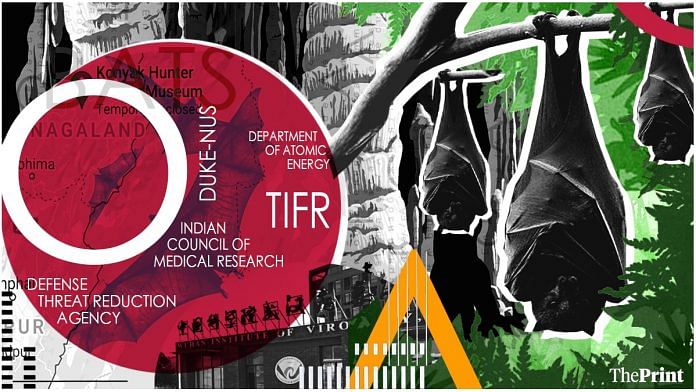New Delhi: As the world is debating the possibility of a lab leak in Wuhan being the origin of the Covid-19 pandemic, the Union health ministry has been engaged in a long and bitter conversation with the Department of Atomic Energy over the National Centre for Biological Sciences (NCBS) in Bengaluru pursuing research on bat viruses without adequate safety protocols.
The episode is significant because safety levels at laboratories engaged in cutting-edge scientific research has become a matter of international concern since the pandemic emerged.
Since the beginning of the pandemic, there has been speculation that it may have had its origin in a lab leak, a theory that appears to be gaining ground in light of new findings and what has been described as China’s reluctance to be transparent with independent investigators.
Senior health ministry officials confirmed to ThePrint that the NCBS has been told to ensure that appropriate safety guidelines be followed in its laboratories, after a multidisciplinary government probe showed that the government institute allegedly carried out the study on bat samples from Nagaland without appropriate clearance from the Indian Council of Medical Research (ICMR), and in a laboratory that did not meet the highest standards of biosafety.
The ministry, however, has not been informed that the study — looking into the spillover of viruses from bats to bat hunters in Nagaland — continues to this day at the Bengaluru-based institute.
Field work for the study was carried out in 2017 and a paper on it published in 2019, but NCBS lead researcher Dr Uma Ramakrishnan informed ThePrint last month that the research was still underway.
Speaking to ThePrint on the condition of anonymity, a senior health ministry official said “this is an old study”.
“It was over two years ago. We had asked them to develop a system where the safety parameters are obeyed and for future research there are no such safety concerns,” the health ministry official said.
Asked if the NCBS is allowed to continue with the study, he said: “The study was over long back.”
On being shown an email from Ramakrishnan that says the study is still on, the official said: “I do not know about this. My impression is that the study is over. I have to check.”
On 26 May, in reply to an emailed questionnaire from ThePrint, Dr Ramakrishnan had said: “The study is ongoing, but we do not have any definitive findings to share at this time. Further work is necessary.”
For the study, the NCBS is partnering Duke-NUS Medical School in Singapore and the Uniformed Services University of the Health Sciences (USUHS), an institution funded by the US Department of Defense (DoD) and located in Bethesda, Maryland. The study itself is funded by the US Defense Threat Reduction Agency (DTRA), also an agency of the US DoD.
The 2019 paper on the study, published in the scientific journal PLOS Neglected Tropical Diseases, had among the co-authors Shi Zhengli of the controversial Wuhan Institute of Virology (WIV), who now famous around the world as ‘China’s Bat Lady’. The WIV is the focus of discussions about Covid being the result of a potential lab leak.
Also Read: I was sceptical of ‘lab leak’ theory. But new info, China’s cover-up made me see differently
‘Research has to follow process’
At the Covid-19 briefing Tuesday, health ministry Joint Secretary Lav Agarwal, replying to a question from ThePrint on alleged violations by the Bengaluru institute, said: “Any research in India has to follow a process. If any such thing is brought to our notice, we will go into the matter and see what action should be taken and what precautions were followed. Then we will take appropriate steps. It is important for Indian labs to work on zoonotic diseases in depth to manage not just this but future pandemics too.”
The health ministry has told the NCBS that the nucleic acid samples that it has collected from bats in Nagaland should be stored in a BSL-4 facility — the most secure possible, like the National Institute of Virology in Pune — and not the BSL-3 lab available at the NCBS.
(Edited by Sunanda Ranjan)
Also Read: Lab leak or natural? How the evidence stacks up in the coronavirus origin investigation



